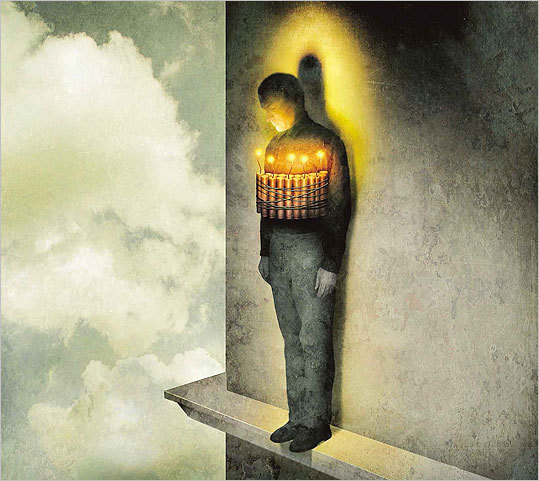Furthermore, this may also be true of rampage killers like Adam Lanza, Dylan Klebold, and perhaps Aaron Alexis. The two groups, long considered to have separate motives, are actually driven by the same desires, Lankford believes. "Anger and rage are common risk factors for both conventional suicide and murder-suicide, and they often drive suicide terrorists as well. For instance, a preemptively arrested suicide bomber known as Rafik admitted that he struggled with uncontrollable anger throughout his life. This included throwing hot tea on his father during childhood, beating up people for saying 'Hi' to him, and threatening to kill a hospital doctor for delivering him bad news."
A quick glance over our sad history of rampage shooters would seem to confirm Lankford's notion that those people, at least, are typically suicidal. Some of them committed suicide-by-cop, most of them directly killed themselves after their rampage. What surprised me more was the evidence Lankford presents that suicide terrorists want to kill themselves at least as much, or more, as they want to achieve any bigger political aims. "... Authorities have similarly asserted that despite their radical ideology, suicide terrorists are 'psychologically normal' and 'psychologically stable,'" he writes. "However, new research has shown that many suicide terrorists were in fact suicidal, for many of the same reasons other people become suicidal, such as depression, hopelessness, guilt, shame, and rage."
Lankford argues that September 11 hijackers Mohamed Atta, Marwan al Shehhi, Hani Hanjour, and Ziad Jarrah all exhibited suicidal tendencies. He also gives the example of Nigerian Umar Abdulmutallab, who posted online that "i am in a situation where i do not have a friend…i have no one to speak too, no one to consult, no one to support me and i feel depressed and lonely. i do not know what to do," before he tried to blow up an airplane over Detroit.
Finally, the suicide bomber and the mass shooter alike may be attempting to link their desire for death with a desire for immortality, or at least notoriety. "The third factor is the desire to acquire fame and glory through killing," Lankford writes. "Most suicide terrorists believe they will be honored and celebrated as 'martyrs' after their deaths and, sure enough, terrorist organizations produce martyrdom videos and memorabilia so that other desperate souls will volunteer to blow themselves up." Not only that, but many suicide terrorists come from societies where opportunities for young men (who comprise the vast majority of both terrorists and mass-shooters) are virtually nil. In the Muslim world in particular, martyrs' families are often fiscally rewarded for the deed, so these men are able to achieve two goals: they end their own suffering, and they provide for their families in one of the only ways available to them.
In his op-ed piece for the New York Times, Lankford concludes, "It is tempting to look back at recent history and wonder what’s wrong with America — our culture and our policies. But underneath the pain, the rage and the desire to die, rampage shooters like Mr. Lanza are remarkably similar to aberrant mass killers — including suicide terrorists — in other countries. The difference rests in how they are shaped by cultural forces and which destructive behaviors they seek to copy. The United States has had more than its share of rampage shootings, but only a few suicide attacks. Other countries are regularly plagued by suicidal explosions, but rarely experience a school shooting."
Would the Columbine shooters, the Adam Lanzas, and the Seung-Hui Chos of the world have been suicide bombers if they'd grown up in the Gaza strip or Saudi Arabia? It's a provocative question, one I had never considered. I'm not sure if I agree with Lankford entirely, but I think his ideas are certainly worth considering.
Further reading:
What Drives Suicidal Mass Killers
The Truth about Suicide Bombers
Martyr Myth: Inside the Minds of Suicide Bombers



One thing that strikes me about the US is the failure of the society as a whole to believe in the treatment of mental illness on any level.
ReplyDeleteOr at least to treat the dangerously mentally-ill effectively. Heaven knows we are inundated with pharmaceuticals of all types for mental illnesses of all stripes, but getting treatment for people like Alexis is what's tricky. Most mentally ill people, even paranoid schizophrenics, are harmless. But one side effect of that illness is a refusal to believe you are ill, and to refuse treatment that's offered. So what do you do? Parents of mass murderers report knowing beforehand that their child was ill and trying to seek help, but short of locking people up against their will en masse (which we stopped doing in the 80s), there's few resources. It's a real problem, and not just in the US. What makes the US deadlier is the easy access to weapons of mass destruction, of course. :(
DeleteOn top of the failure to properly treat mental illness, it astounds me how many people with obvious symptoms of mental illness get cleared for high-level jobs with national security responsibilities. Is it a matter of if we don't admit there's a problem, there isn't one?
ReplyDeleteAs for comparing suicide bombers with mass murderers, I think there's some truth in Lankford's theories, but I also think he's being a little simplistic. Societies that spawn suicide bombers indoctrinate their people with blind hatred for outsiders from an early age, and teach them that it's righteous and holy to destroy infidels. It's a part of their lives. It's part of their belief system. Sure, someone who's depressed is more likely to volunteer for a suicide mission, but aren't others also conscripted into missions against their will?
There does seem to have been a gaping hole in security that allowed Alexis access to the Navy Yard, that's for sure. I don't know what level of clearance one has to have for his kind of job. I grew up in a town where practically everyone had a Q clearance (pretty high level) and let me tell you, they were scrutinized out the wazoo. Even in my current neighborhood, with a lot of DOE and DOD employees, we have the FBI knocking on doors asking questions about those who work with classified/security stuff. They seem to take it pretty seriously.
DeleteThinking aloud: maybe our 20-20 hindsight is not an accurate way of viewing things, though. We see his history and it seems obvious that he was going go beserk. But for those monitoring him, it probably wasn't obvious at all. Most people with histories exactly like his go on to commit zero rampage murders. When trying to decide who to stop before they explode, where do we put our limited resources? It's really a needle in a haystack, statistically — even given the "warning signs." Lots of noise, no clear signal.
Good point about the suicide bombers. I don't know how many are forced into it, that would be interesting to know. That particular microculture (which, I always hasten to add, is not Muslim culture globally) certainly does a very good job of grooming suicide bombers. I am still intrigued at the idea that they may be motivated as much by a desire to end their lives as to achieve personal glory and political aims.